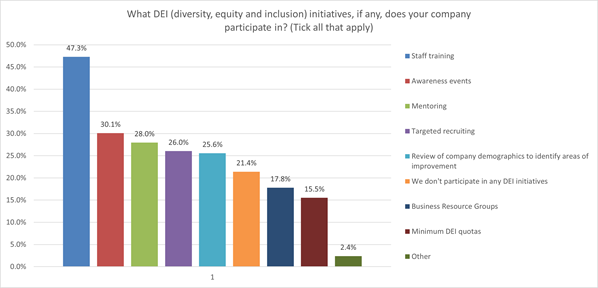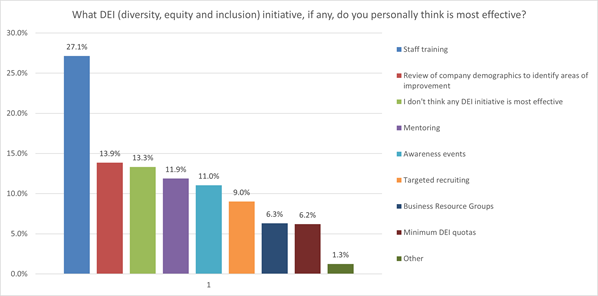In APAC, Singapore sees highest stagnation in DEI and gender pay equality practices
31 May, 2023
- Majority of Singapore workers feel that gender pay equality (47%) and diversity, equity, and inclusion (DEI) (43.1%) within their companies have not seen improvements in the past three years.
- This is in contrast with APAC regions like Australia, China and India, where respondents generally feel that gender pay equality (55.5%) and DEI (57.8%) have improved in the past three years.
Singapore – 31 May 2023, 47% of Singapore workers feel that their companies have not addressed their gender pay equality over the course of the past three years, reveals the ADP® Research Institute’s People at Work 2023: A Global Workforce View. Over 43% of workers feel the same way when it comes to DEI policies.
 |
 |
This is in sharp contrast with other APAC markets like Australia, China, and India, where over 50% of APAC workers feel that their companies are performing better than three years ago when it comes to gender pay equality and DEI.
 |
 |
These findings are surprising, given that companies have acknowledged for years the positive impact of DEI practices in their companies. A 2021 survey by the Singapore National Employers Federation(SNEF) and Kincentric found that the majority of firms recognise the importance of inclusivity practices on company culture and employee engagement1.
Yvonne Teo, Vice President of HR, APAC, ADP, says: “This stagnation is concerning when compared to the rest of APAC as it suggests that Singapore-based companies, which depend heavily on human capital, have not kept up with the rest of the region with regards to inclusivity.
“It is important for businesses to address these differences, as Singapore has a multi-ethnic workforce as well as an increasingly global labour pool. Failing to address DEI and gender equality practices can have considerable repercussions on talent retention, as talented employees might look at greener pastures where their differences are valued."
“Companies can address this issue in different ways. Payroll data – often considered a back-office function – is an important tool to identify and provide C-suites with information on gender or ethnic pay gaps. Companies should also consider investing regularly on the promotion of new roles and job openings to a different cohort of applicants, while supporting internal initiatives that foster connections and champion diversity.”
Common DEI Initiatives & Practices
When it comes to listing DEI practices their companies participate in, most employees cite training (47%), awareness events (30%) and mentoring (27%) as the most common practices.
However, when employees are asked what DEI practices do they personally perceive as most effective – while most employees agree that training (27%) is important – many employees (13.9%) feel that a ‘review of company demographics to identify areas of improvement’ should be done. The corresponding charts can be found in Appendix 1.
These findings come from the recent People at Work 2023 report, where ADP Research Institute® surveyed 32,612 workers in 17 countries around the world between 28 October and 18 November 2022 including over 8,613 working exclusively in the gig economy.
ENDS
APPENDIX 1


For more insights, please read the ‘People at Work 2023: A Global Workforce View’ report here.
About the research
People at Work 2023: A Global Workforce View explores employees’ attitudes towards the current world of work and what they expect and hope for from the workplace of the future.
ADP Research Institute® surveyed 32,612 workers in 17 countries around the world between 28 October and 18 November 2022 including over 8,613 working exclusively in the gig economy. This included:
- 7,721 in Asia Pacific (Australia, China, India and Singapore)
- 15,290 in Europe (France, Germany, Italy, the Netherlands, Poland, Spain, Switzerland and the UK)
- 5,751 in Latin America (Argentina, Brazil and Chile)
- 3,850 in North America (USA and Canada).
Within the worker sample gig workers and traditional workers were identified. Gig workers were identified as those who work on a contingent, temporary, or seasonal basis, or as a freelancer, independent contractor, consultant, gig worker, or use an online platform to source work. Traditional employees were identified as those who are not working in the gig economy and instead have a permanent full or part-time position.
The survey was conducted online in the local language. Overall results are weighted to represent the size of the working population for each country. Weightings are based on labour force data from the World Bank,2 which is derived using data from the ILOSTAT database, the central statistics database of the International Labour Organization (ILO), as of February 8, 2022.
About ADP (NASDAQ – ADP)
Designing better ways to work through cutting-edge products, premium services and exceptional experiences that enable people to reach their full potential. HR, Talent, Benefits, Payroll and Compliance informed by data and designed for people. Learn more at ADP.com
ADP and the ADP logo are registered trademarks of ADP, Inc. All other marks are the property of their respective owners. Copyright © 2023 ADP, Inc.
Media Contacts:
Distilleri
hello@distilleri.sg
1 https://snef.org.sg/snef_news/singapore-employers-should-manage-diversity-equity-and-inclusion-at-workplaces-more-
2 Source: The World Bank, Labor force, total, World Development Indicators database, February 8 2022